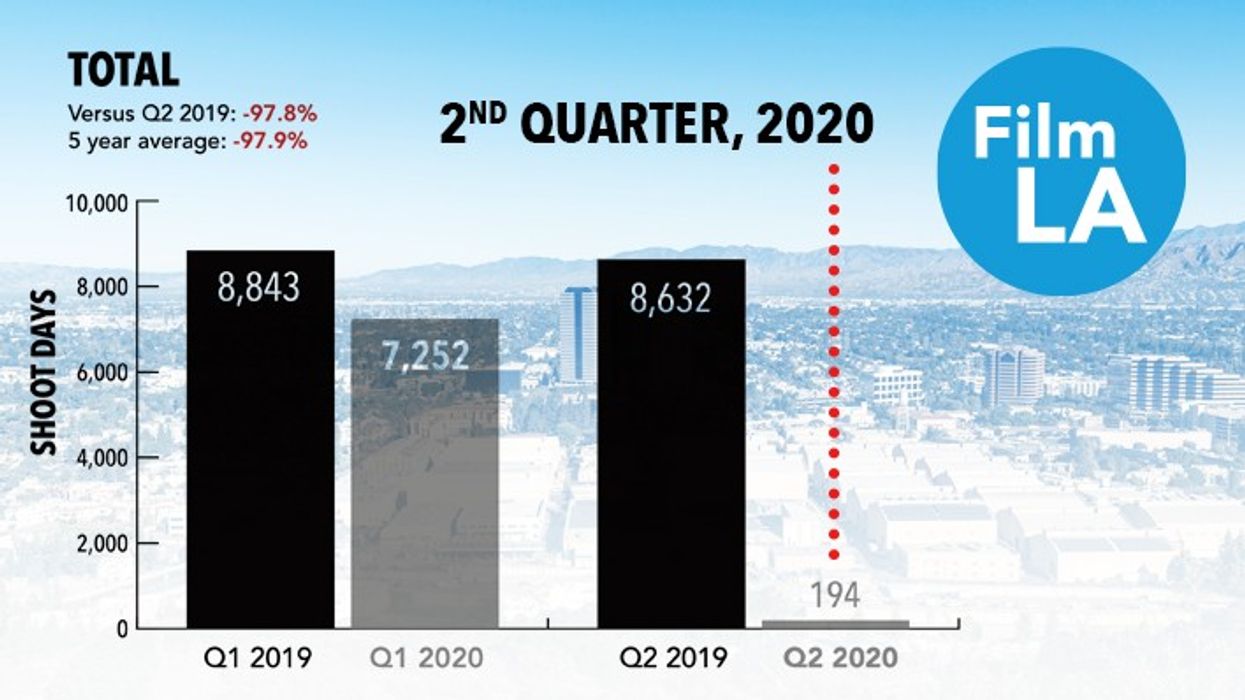Coronavirus Crushed Productions in Los Angeles, What Can Filmmakers Do?
The challenge facing this community is growing.

Nearly all film and television location shoots in the Los Angeles area were stopped dead in their tracks by the coronavirus shut down from April to June.
According to Los Angeles Times, L.A. recorded just a mere 194 shoot days during the second quarter of 2020—accounting for only 2% of the 8,632 recorded in the same quarter last year. (In their reporting, the Times cites nonprofit group FilmLA to assert that those numbers mark “the lowest filming level on record.”)
FilmLA President Paul Adley also stressed to the Times that “we also have to be very concerned about the thousands of small businesses that depend on this industry and whether they have been able to sustain for three months-plus without work.” By Adley’s estimate, some 5,000 small businesses in the region with a staff of 10 people or less rely on an operational film industry to stay afloat.
Teams working on advertising shoots, commercials, and TV projects have slowly resumed their schedules, provided they adhere with County authorities' health orders. Some TV soaps, like General Hospital and The Bold and the Beautiful, for instance, have continued filming on sound stages. That experiment has yielded mixed results: The latter production was forced to be put on pause in June due to a lack of proper testing.
Setbacks like that don't bode especially well for larger crews eager to return to work. So, what’s a working crew to do?
If you’re applying for a film permit in L.A., you’re far more likely to get approved to shoot a small production—such as a commercial or music video—than to shoot a feature. Feature films are not expected to go before cameras until at least August.
Some filmmakers and freelancers have been able claim some money lost to rapid industry unemployment through the CARES Act. As we reported in April, the CARES Act provides unemployment eligibility for independent contractors. Its Paycheck Protection Program (PPP) initiative also provides loans for freelancers, small production companies, and all small businesses that don’t have to be paid back. The deadline to apply for those loans only just closed on June 30, so the effects of PPP have yet to be measured.
When we spoke with film and TV editor Zack Arnold, the Cobra Kai cutter told us that when it comes to PPP, "Protection" is the key word that small business owners in the industry should remember.
"['Protection'] means that you can use the stimulus cash to continue paying your existing employees to ensure they don’t go on unemployment," Arnold explained. "And if you don’t furlough them, that loan will be converted into a grant (i.e. it’s free money you pass along to your team so they are still available to you when work returns)."
Any freelancer, independent contractor, or small business owner who's able to successfully receive such incentives will at least have some short-term relief. But Arnold expressed doubt over whether these funds could be used to grow and expand your workforce.
If you're a working crew member in L.A., tell us: Have you applied for a film permit in the region? Have you received unemployment benefits or loans through the CARES Act, and if so, what impact has it had on your activity in the industry? Let us know how you've fared in the comments below.











